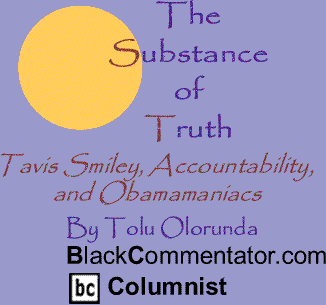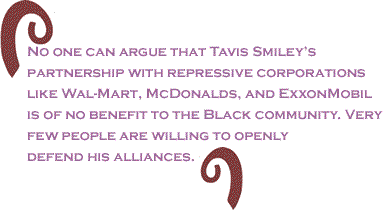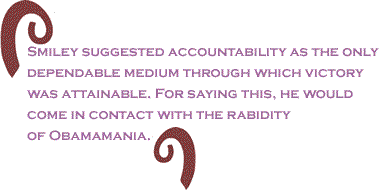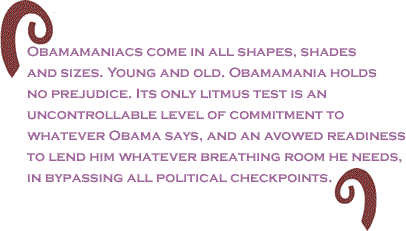
|
|||||||||||||||||||||||

|
|

Custom Search
|
|
 |
|
“Powers keep on lying/ While your people keep on dying/” -- Stevie Wonder, “Higher Ground,” Innervisions “No one called the late J. Edgar Hoover a terrorist, though that is precisely what he was: and if anyone wishes, now, in this context, to speak of ‘civilized’ values or ‘democracy’ or ‘morality,’ you will pardon this poor nigger if he puts his hand before his mouth, and snickers—if he laughs at you.” --
Baldwin, James. Just
Above My Head Ya’ll can’t handle the truth in a courtroom of lies/ … Blind leading the blind/ … A generation pure in it’s own mind/ ... When the Son of Perdition is Commander in Chief/ The standard is Thief/ Brethren can we candidly speak?/ … It’s time for rebirth/ Burning up the branch and the root/ The empty pursuits of every tree bearing the wrong fruit/... You’ll find what you sought/ Was based on the deception you bought/ A perception of naught/ Where the majority remains caught/” -- Lauryn Hill, “Mystery of Iniquity,” MTV
Unplugged No. 2.0 The radio/TV journalist Tavis Smiley has again found himself between the crosshairs of angry Black people. This time, Smiley is being faulted for soliciting the services of mortgage giant Wells Fargo & Co. A March ‘09 NAACP lawsuit, filed with the U.S. district court in Los Angeles, accusing Wells Fargo and HSBC Holdings Plc of subjecting African-American lenders to “disparate adverse treatment,” by imposing disproportionate loan terms, is being touted as legitimate reason to accuse Smiley of moral fraudulence. [Context: It’s important to note that the same NAACP President, Ben Jealous, now being hailed as a 21st century messiah, was the one who, in 2002, stood aghast as BlackCommentator.com columnist, Jonathan Farley, was undergoing merciless persecution—ultimately chased out of the country—by a modern-day KKK sect. It was none other than Jealous, himself, who told Farley that he had “asked for it,” and now had to bear the consequences of his action.] Because Wells Fargo is also a title sponsor of the C-SPAN broadcast “State of the Black Union” (SOBU), which Smiley hosts annually, his detractors feel confident in asking that he cast the racial demons out of, and denounce his associations with, the mortgage company. No one can argue that Tavis Smiley’s partnership with repressive corporations like Wal-Mart, McDonalds, and ExxonMobil is of no benefit to the Black community. Very few people are willing to openly defend his alliances. Nevertheless, most of the noise-makers, in this instance, are less interested in the impact Wells Fargo’s alleged racist practices is having on the Black Community, but rather, see this as a perfect opportunity to jump down Smiley’s throat, for his call early last year that Black people hold then-Senator Barack Obama accountable, along the road to the White House. In January 2008, Tavis Smiley offered a commentary on the nationally-syndicated Tom Joyner Morning Show—which boasts the largest audience of African-American listeners. In it, he remarked that, in spite of the hysteria over Obama winning the Iowa state primaries, Black people would do well to keep a disciplined mind, vis-à-vis the Obama campaign. He suggested accountability as the only dependable medium through which victory was attainable. For saying this, Smiley would come in contact with the rabidity of Obamamania. Before long, his personal and professional life was turned upside down, as death threats to family and relatives, including his mother, came flying in. Before the death threats, however, Smiley attempted to put into context his worries concerning Obama’s unremarkable record on the problems afflicting Black America. The first sign of Obama’s reluctance to being branded the “Black candidate” seemed to come from his refusal to attend the 2007 SOBU forum. This decision made furious many attendees, including Princeton University’s very own Cornel West, who accused Obama of “walking” a “tight rope.” Dr. West, later on a surrogate for Obama, explained that “he’s got folk who are talking to him who warrant our distrust.” West expressed some skepticism over the apparent coincidence of Obama’s plans to announce his run for the presidency on the same day Tavis Smiley had set up the SOBU event—a year in advance. He suggested that Obama’s Springfield announcement, given that context, was appearing to be more “about somebody else,” than the Black Community. West continued: “He’s got large numbers of white brothers and sisters, who have fears and anxieties, and he's got to speak to them in such a way, that he holds us at arm’s length, enough to say he loves us, but doesn't get too close to scare them off.” A year later, Obama, again, was nowhere to be found. Opting, unlike Hillary Clinton, to speak elsewhere on the campaign trail in Texas, Tavis Smiley took him to task for dodging an opportunity to speak directly to Black people about the issues confronting the Community. Obama, in a cynical move, would offer up Michelle Obama in his lieu. Tavis Smiley, flatly rejecting this pitiful gesture, argued that Michelle Obama is no politician, and shouldn’t be expected to act as such. Unfortunately, many Obamamaniacs, and downright Obama supporters, weren’t thrilled about Smiley’s confrontation with their leader. Before long, he had assumed the status of the most hated Black man in America.
The drive to hold up the PBS host as an example of what could happen to Obama’s Black detractors was mostly fueled by the campaign of YourBlackWorld.com founder, Dr. Boyce Watkins, also a Syracuse University Professor. As one whose allegiance to Obama remains unbroken, coming after Smiley was a no-brainer, for him. In a February 2008 column, Watkins commended Obama, because he, in his words, “owes no one, he has a new team and he refuses to be beholden to the Civil Rights Movement.” This display of ignorance, mixed with misinformation, is what led many into believing Obama was a “new kind” of politician, without the old stale of Washington—without a dependence on D.C.’s ubiquitous corporate interest groups. Public figures like Watkins were able to sell the lie that Obama shot to fame from relative obscurity, even when simple internet searches, let alone serious academic research, could swiftly put their unfound theory to bed. It was such bold, declarative statements that kept at bay the truth, about Obama’s corporate funding and donorship. Watkins, through his website, began waging a war of words against Tavis Smiley. Dr. Watkins hastily condemned Tavis Smiley for his “snub of Michelle Obama,” which he described as a “slap in the face of Black women everywhere who have tremendous respect for Michelle.” Watkins deliberately inserted himself into the brewing controversy over Smiley’s comments, and catapulted himself to a national stage, where he could best perform as a referee of sorts, in the desired boxing match between Smiley and Obama. Watkins is one of the few
gifted communicators we have left. He has an uncanny ability to
suggest one thing, while meaning the other. This tactic helped him
during the Smiley brouhaha, as he untruthfully suggested feeling
“sorry for Tavis after seeing the reactions of our readers,”
though he confessed to using his, at the time, “nearly 100,000
Black readers per week,” as a “fitting venue to let the world
Unlike Watkins, Dr. Lacewell was more explicit in her convictions. She railed against any Black leader demanding accountability from Obama, informing them that he “can deliver the black vote to himself, by himself, with little help from these self-proclaimed racial power brokers.” Lacewell, like Watkins, accused Smiley of being “jealous,” and thus, one need not take serious his calls for holding Obama’s feet to the fire. In an op-ed piece, she asked the question: “Does Tavis realize that Obama is trying to win an election?” Those who think like Dr. Lacewell and Watkins were the ones who helped Obama clinch victory, with a 96% Black electorate support, without any specific commitment to the Black Community. Those who think like them were the ones who bypassed the opportunity, unlike Dr. West, to inform Obama that abusing Dr. King’s legacy, by skipping his Memphis memorial service for an Indiana campaign stop, is an unforgivable offense. Those who think like them saw no wrongdoing in Obama’s cynical dismissal of Dr. King as a mere “young preacher from Georgia.”
Black thinkers, academics, scholars and intellectuals like the two listed above might not be a direct threat to the development of future freedom-thinkers, but they aren’t helping the cause, either. They might skillfully masquerade as insurgent intellectuals, but when the going gets tough, and reality confronts them at the fork of the road, we’ve see which direction they’re quick to take.
As Black folks, we can’t afford to hit the snooze button anymore. It’s time to wake up—to rise and shine! Our waking hour is long over-due. Our eyes have been opened—we just refuse to see. Clinging to the emotional appeal of having a first Black president is useless when the very man is confident that the “justifiable pride” in moving beyond “some of the searing legacies of racial discrimination in this country,” only “lasted about a day.” What other confirmation do we need? What else do we require before starting to take matters into our own hands, and doing for self? What other signs do we seek, before beginning to hold President Obama accountable? BlackCommentator.com Columnist, Tolu Olorunda, is an activist/writer and a Nigerian immigrant. Click here to reach Mr. Olorunda. |
|
Any BlackCommentator.com article may be re-printed so long as it is re-printed in its entirety and full credit given to the author and www.BlackCommentator.com. If the re-print is on the Internet we additionally request a link back to the original piece on our Website. Your comments are always welcome. eMail re-print notice
If you send us an eMail message we may publish all or part of it, unless you tell us it is not for publication. You may also request that we withhold your name. Thank you very much for your readership. |
|
| |
|
| April
9 , 2009 Issue 319 |
|
| Executive Editor: Bill Fletcher, Jr. |
| Managing Editor: Nancy Littlefield |
| Publisher: Peter Gamble |
| Est. April 5, 2002 |
Printer Friendly Version
in resizeable plain
text format or pdf
format. |
| Frequently Asked Questions |
 |

|
 |
 |
 |
| |
| |





































